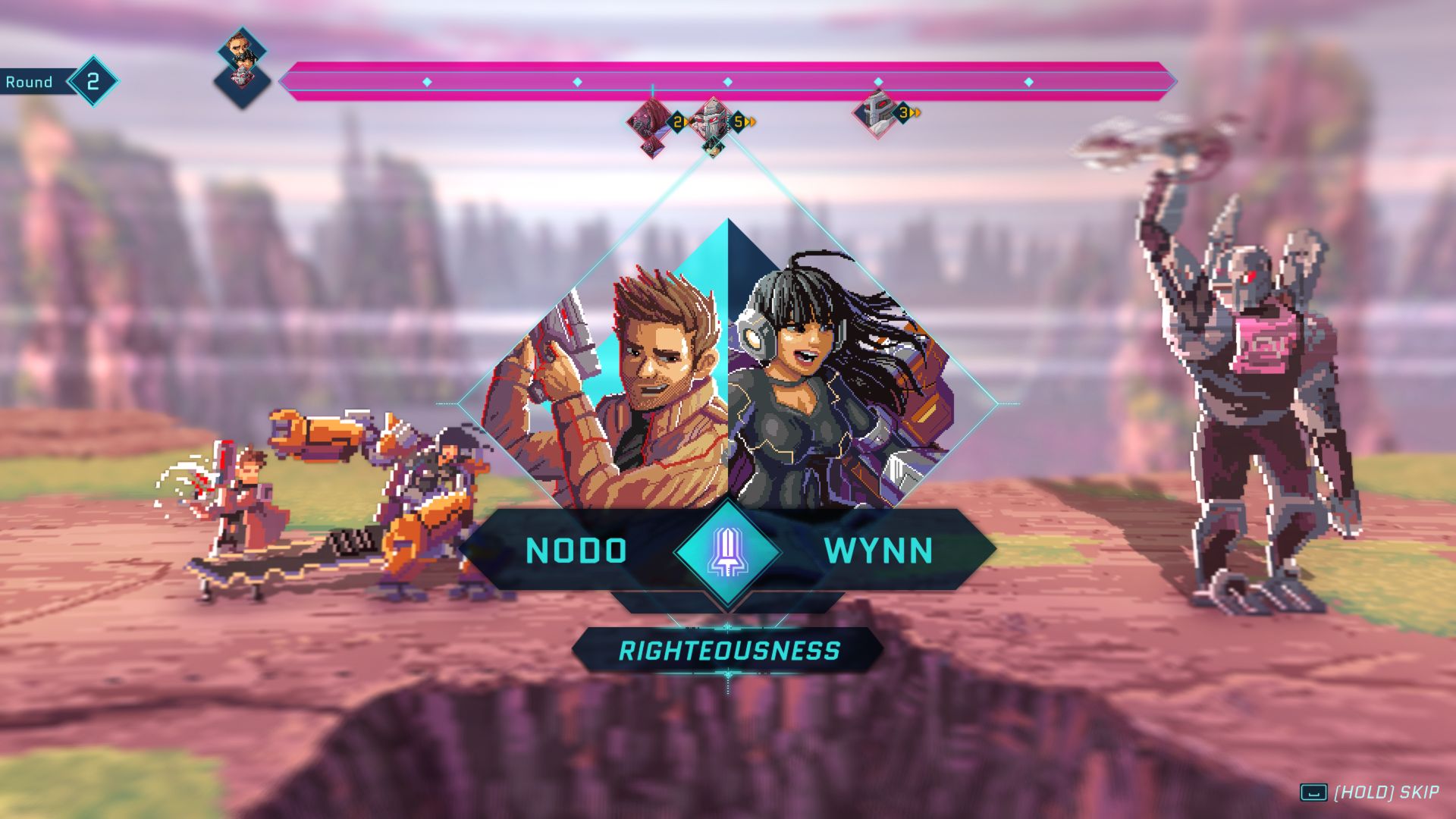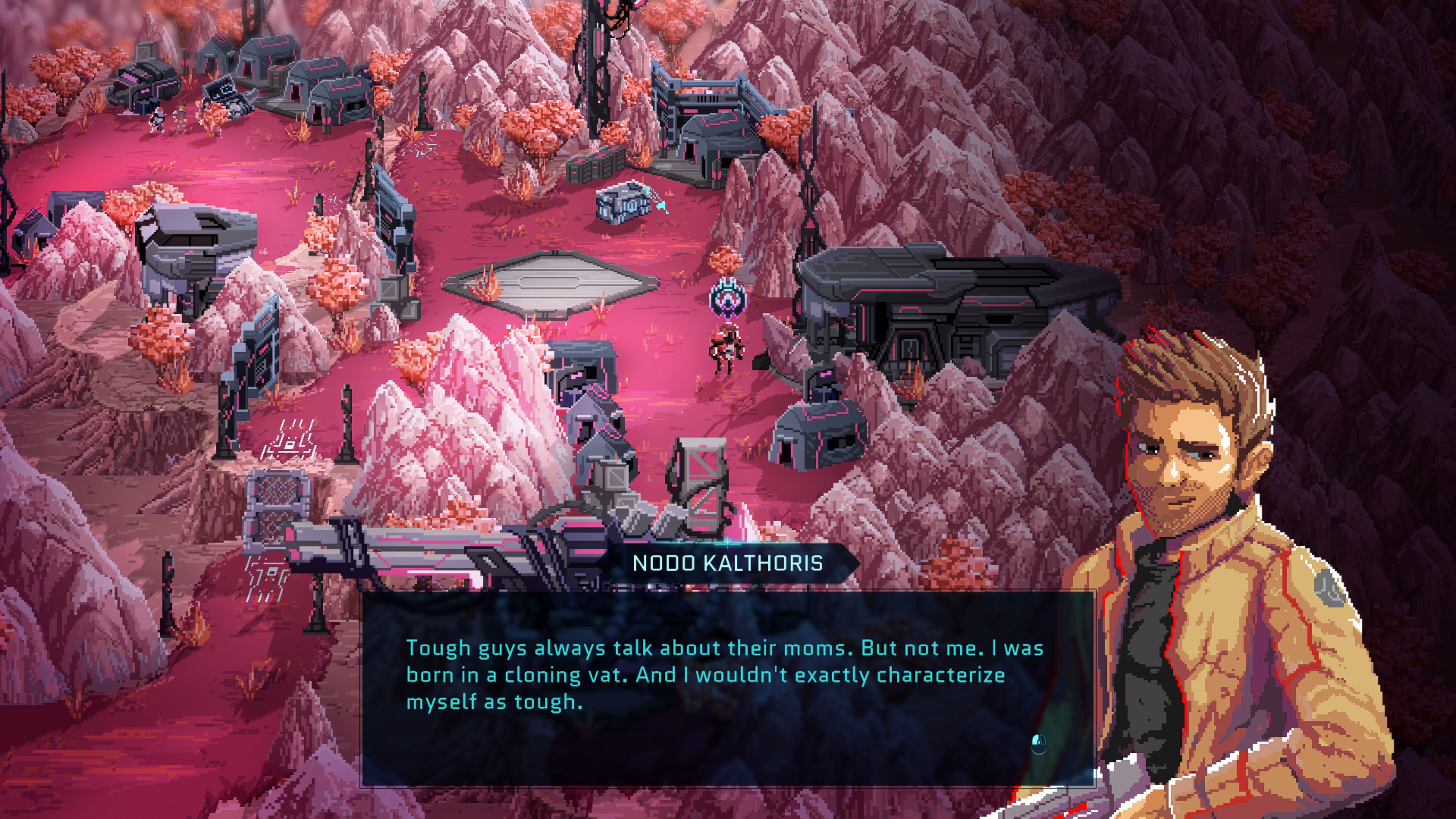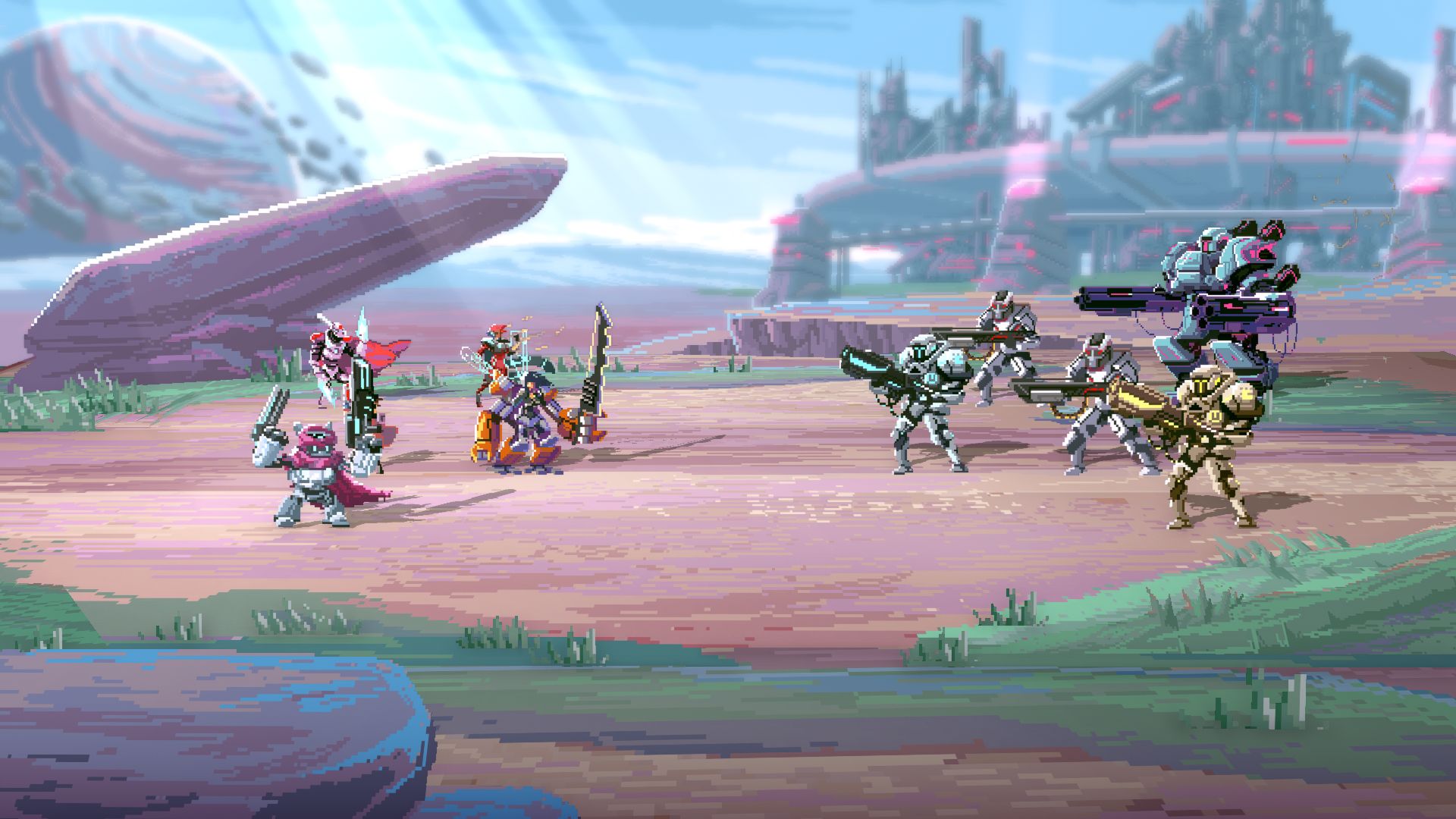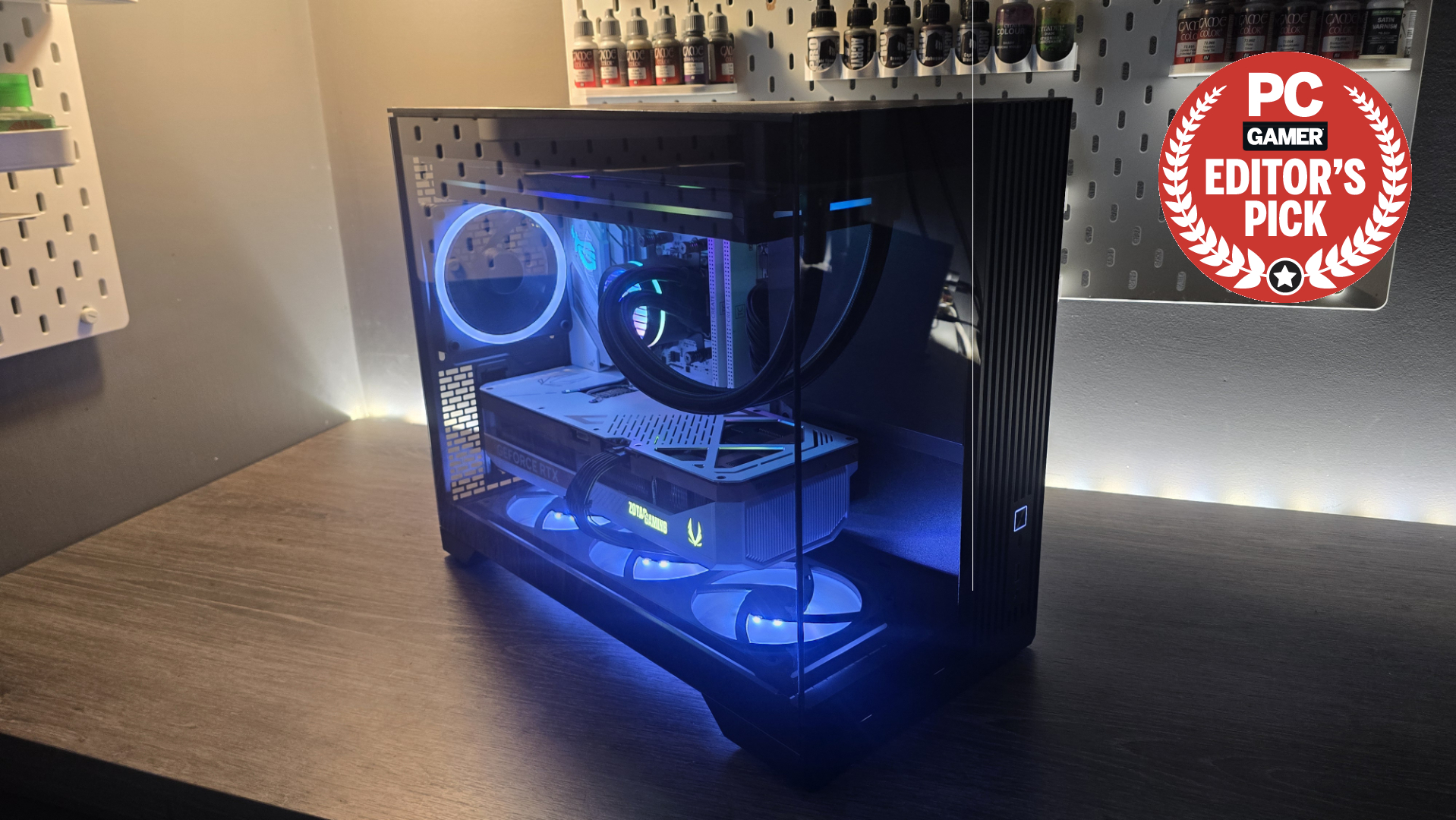Our Verdict
A multiversal master of none, with a messy but intriguing combat system at its core.
PC Gamer's got your back
What is it? A tactical RPG roguelike that's a bit like if... oh god.
Expect to pay $25/£19.49
Developer Massive Damage
Publisher Raw Fury
Reviewed on Radeon RX 580, AMD Ryzen 5 2600 3.9GHz, 16 GB RAM
Multiplayer? No
Link Official site
You know that way of describing a game, or a film or a sandwich or whatever, where you condense it down to the simple formula of 'x meets y'? There's a temptation to do that with Star Renegades, but I suspect if I tried, my nose would start bleeding. A lot of games are magpies, lifting shiny ideas to decorate their own nests—but this is more like two people's Steam libraries got into a tragic accident involving a pair of matter transporters.
So, in the interests of keeping my philtrum unbloodied, I'll pick a single comparison point, the one that matters most to me: roguelikes. Specifically, in the post-FTL model, where you make your way along a branching path of nodes, each representing a combat encounter. In this case, those nodes are split across three planets and a mothership (yes, a lot like the four acts of a Slay the Spire run) and those encounters are between a battalion of extradimensional invaders and your motley Guardians of the Galaxy-style crew.
Lose the entire squad, and you'll be swatted right back to your starting point. But the game is keen to show you this ain't so bad, really—there are new abilities and characters to be unlocked for next time, by spending the two currencies that carry across between runs—and so it sets you up to fail early on. And when you do… ---bzzzt---

Oh hi there! It's the Alex of Earth-2880 here. As I was saying, I'll pick a single comparison point: Into the Breach. See, Star Renegades just wholesale nicks the concept that each game-over closes off a timeline, and your next run takes place in a parallel universe. I'm afraid the Alex you previously knew is wiped out forever, and now you've got me instead. Not that you'd be able to tell, because—like Star Renegades' heroes—I look and sound exactly the same in every universe. There are no forays into the multiverse's wilder corners here, alas, no versions of main hero Wynn Syphex where she's a cartoon pig or a self-narrating noir detective. Even the abilities are the same, unlocking along a set path rather than a blossoming tech tree, so the only real difference between alt-universe selves comes from the gear you find and equip them with along the way. In my case, I've got a fancy mechanical keyboard with tactile switches for +10 typing, let's hope it's enough to ---bzzzt---
Star Renegades is a cuckoo, using the appearance of familiar games to bamboozle you until its finest idea can hatch inside your brain-nest.
Hi, Alex-0079 here, with the one comparison that really matters: JRPGs. Not because Star Renegades plays like one but because it takes all their basic trappings and condenses them down into something that can fit into a normal life without requiring a bit of logistical Tetris. So you've got the gradual gathering of a party, trading banter as their bonds develop, and even an old-school overworld for your conga line of squished hero sprites to toddle across. But here the whole galaxy-spanning quest wraps up in five or six hours—by which point, in most Final Fantasy games, you'd barely be out of the starting town.
Combat looks like it could be lifted straight out of a 16-bit era JRPG, at first glance: the heroes and villains politely agreeing to line up on opposite sides of the screen and take it in turns to unleash attacks on one another from an ever-growing menu. But try playing it like an RPG and ---bzzzt---
Taking initiative
A magpie? No, Star Renegades is a cuckoo, using the appearance of familiar games to bamboozle you until its finest idea can hatch inside your brain-nest. The kind of trick only lesser Alexes would be fooled by, which is why they're all gone now, like tears in multiversal rain. I'm the one from the tactics-gamer timeline, and I'm here to tell you why combat is the thing that'll keep you coming back for more.
Keep up to date with the most important stories and the best deals, as picked by the PC Gamer team.
Every turn plays out along a sixty-second timeline—think XCOM: Chimera Squad or a D&D initiative track. If you can get an attack in before a foe, you'll land a crit on them. Crits can add extra damage or special effects or, most important of all, push your target back a few seconds. Cue up enough pushback and you might be able to nudge them off the track entirely, causing them to miss their go. Of course, enemies can do the same right back—so it's all about balancing big hits, which tend to be slower, with speedy pre-emptive strikes.

There's some rock-paper-scissors type-advantage business, but the timeline is the source of all the game's chewiest strategic decisions—and its finest moments, when you finally spot a way to postpone what would've been a lethal blow. This isn't always as simple as it could be, thanks to a combat UI that could've done with a couple more passes. In all fairness, there's a lot to communicate, but important information is too often lost under layers of flashy FX, clouds of damage numbers and just way too many icons that never explain themselves. Not that this is a problem for a superior tactics-gamer brain like mine, of course, I'll never be ---bzzzt---
Gosh, with its love of raggedy pixels, a blue-pink colour scheme and mountainous corpses on the overworld, don't the visuals remind you of Hyper Light Drifter? ---bzzzt--- Hi, Alex from a dimension where he's played Fire Emblem: Three Houses here, to note that Star Renegades has its version of the support level-up cutscenes where two characters share a bonding moment. ---bzzzt--- Alex-0451, here to tell you how Star Renegades borrows from immersive sims. Nah, just kidding. ---bzzzt--- There is, however, an honest-to-god Nemesis system, like in Shadow of Mordor, though nowhere near as brilliantly realised. Still, it was enough to have me cursing Mirax Vance's name to the heavens as he escaped vengeance for the second time, a last sliver of health intact, having wiped the previous squad off the ---bzzzt---
You can see why I was worried about nasal haemorrhages, right? And it's just not talking about the game; playing it, you're constantly bumping against jagged edges where one of those xs meets a y. If just one aspect of Star Renegades appeals to you, there's almost certainly another game that does it better. But, if you can stomach the occasional dimensional lurch, there's plenty here to like—not least the one idea that is, more or less, the game's own.
A multiversal master of none, with a messy but intriguing combat system at its core.


